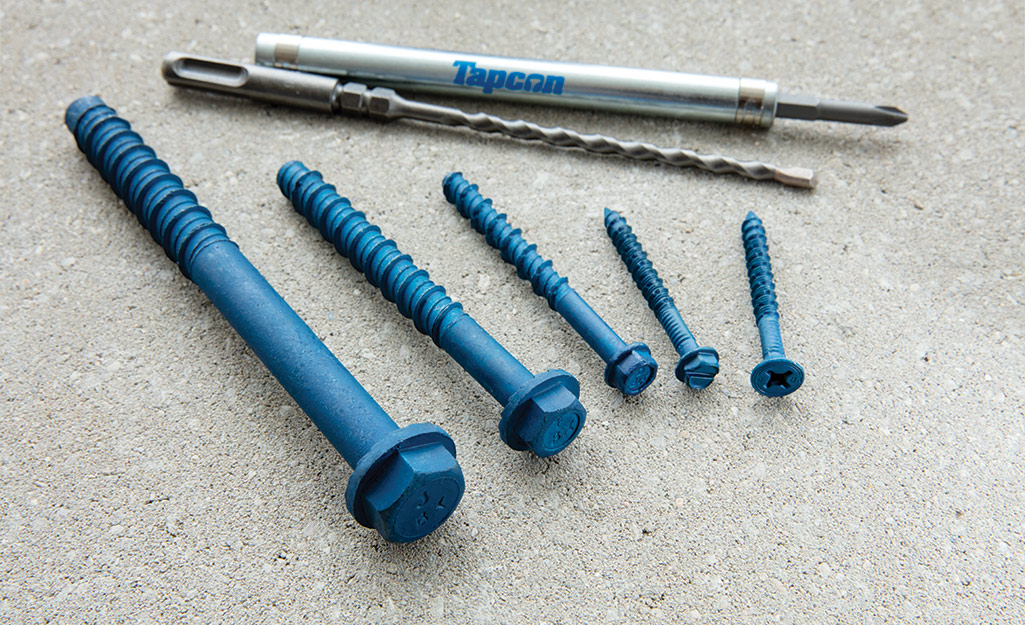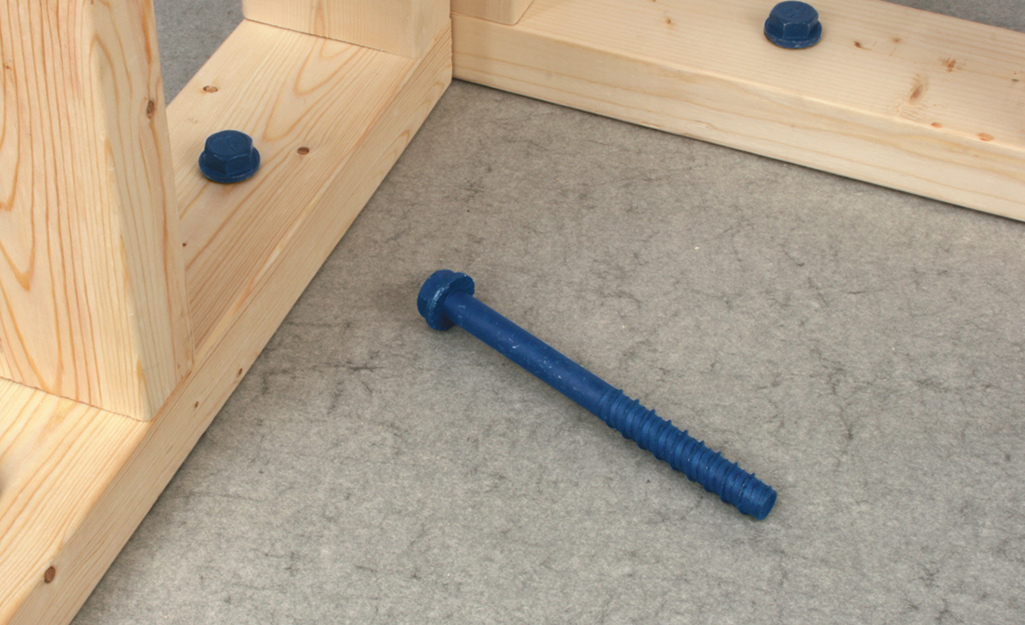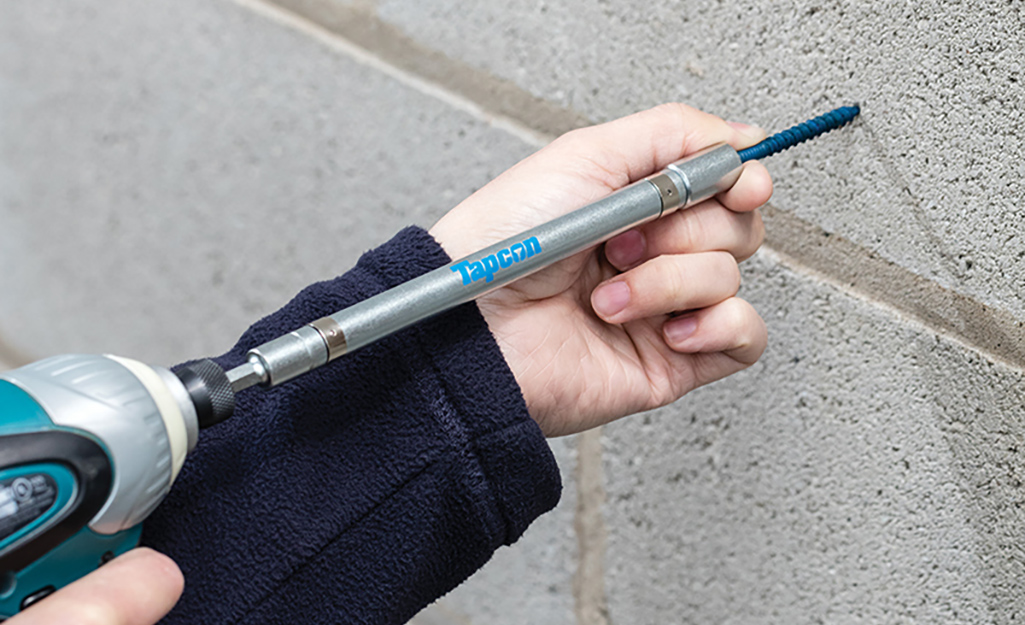Types of Masonry and Concrete Anchors

Last updated April 24, 2024
When you find it difficult to insert fasteners directly into a concrete wall or other hard surface, you may need to insert anchors before securing the screws. This guide will teach you the best types of concrete anchors and masonry anchors to use for your next home improvement project.
Safety Tip: Always wear safety goggles and a dust mask when drilling.
Table of Contents
Anchor Load Types & Capacity
Anchor Types Overview
Concrete Anchor Types & Features
Working with Masonry & Concrete Anchors
Anchor Load Types & Capacity

Different types of loads describe different types and directions of force on an object. When choosing concrete anchors, consider the type of load as well as the load capacity the anchor can bear. Compare the anchor load type and capacity to the weight and potential movement of the object you are hanging.
- The shear load describes the amount of downward force the weight of an object exerts on the anchor.
- Tensile load is the amount of force required to pull the anchor straight out of the hole.
- Static loads are created by objects that never move and constantly exert the same force.
- Dynamic loads are created by objects that move or vibrate.
- Impact loads are created when weight is increased suddenly.
Anchor Types Overview

Concrete anchor types vary and include concrete screws, hammer-set anchors, lag shields, lead screw anchors, plastic wall plugs, anchor bolts and more. Masonry and concrete anchor types are considered light-duty, medium-duty or heavy-duty, based on how much weight they can support.
- Light-duty anchors are good for wall hangings that weigh up to 50 pounds.
- Medium-duty anchors are good for wall hangings that weigh up to 200 pounds.
- Heavy-duty anchors are good for structural needs and wall hangings over 200 pounds.
Concrete Anchor Types & Features

Concrete Screws:
- For medium-duty
use. - Feature alternating high and low threads with diamond-cut notches for extra holding power.
- May be sealed to provide protection against corrosion.
- Best for attaching furring strips, doors and electrical boxes in concrete, brick, stucco or blocks.
Lag Shields:
- For medium-duty
use. - Used in conjunction with lag bolts.
- Short shields work well on shallow surfaces.
- Long shields provide greater strength.
- Best for use in hard masonry while shorter shields are better for softer materials.
Plastic Wall Plugs:
- For light-duty
use. - Require a pilot hole.
- Expand once inserted to prevent turning and pullout. Tapered ribs prevent twisting.
- Best for light-duty applications in masonry, stucco and brick, such as towel bars, tool brackets and shower doors
Sleeve Anchors:
- For medium-duty
use. - Length is measured from the washer to the end of the anchor. Sleeves pinch the side of the pilot hole and get tighter as the screw is driven into place.
- Best for medium-duty applications, such as metal railing and grab bars, set in concrete block.
Toggle Bolts:
- For light- to medium-duty use.
- Feature a set of wings that spring open once the bolt has been placed in the hole and the screw has been tightened.
- Wings provide a brace against the backside of the wall for a secure hold.
- Best for light to medium loads in hollow block.
Wedge Anchors:
- Extremely strong for heavy-duty
use. - Length is measured from end to end. Stainless-steel expansion clip resists corrosion. Once inserted, nearly impossible to remove.
- Best for heavy-duty load applications in concrete blocks and thin-wall or solid concrete.
Ribbed Plastic Anchors:
- For light-duty
use. - Extremely versatile.
- Require a pilot hole. Have expanding wings that grip interior of the wall. Can be used in all types of walls, but most commonly used in drywall.
- Best for lightweight ornamental fixtures, bathroom fixtures and electrical plates set in drywall, stucco, tile and some masonry.
Working with Masonry & Concrete Anchors

- Use a hammer drill when installing anchors into hard surfaces, such as stone, concrete and brick. Regular drill bits will dull too quickly.
- You will need to drill a pilot hole when using any type of concrete anchor.
- Be sure to have plenty of extra bits on hand and use a can of compressed air or a blower to clean dust away from the drilled hole.
- Use chemical anchors and powder-actuated anchors when working with an extremely heavy object that requires an industrial-strength hold. These anchors are strengthened with chemicals – you will need special instructions on how to use them.
- Anti-rotation fins prevent anchors from spinning while they are being inserted, strengthening their hold.
The right types of masonry and concrete anchors for your project will depend on the material you are drilling into and the weight of the object you're hanging. Light-duty and medium-duty anchors can support most fasteners and DIY projects. For especially tough surfaces and for making structural connections, use a heavy-duty anchor.
Need help identifying a tool or material? Find products fast with image search in The Home Depot Mobile App. Snap a picture of an item you like, and we'll show you similar products.































